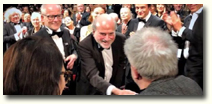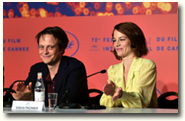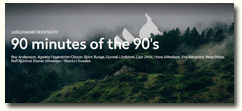|
 It’s
hard to argue that the subject matter of Terrence
Malick's new film, A HIDDEN LIFE, which premiered
in competition in Cannes on Tuesday, is almost
tailor-made to fit the director's cinematic agenda. The
based-on-fact story of the Austrian farmer Franz
Jägerstätter (August Diehl), whose refusal to swear
allegiance to Hitler and serve in the army during World
War II led inexorably to his execution in 1943,
possesses all of the elements of an archetypal Malick
film. The director has a well-known penchant for
protagonists who spurn the material world for higher
spiritual callings. In addition, focusing on
Jägerstätter’s hometown, the idyllic mountain village of
St. Radegund in Upper Austria, allows the director to
indulge his fondness for capturing achingly beautiful
natural landscapes. One must, of course, recall
Days
of Heaven (1978). It’s
hard to argue that the subject matter of Terrence
Malick's new film, A HIDDEN LIFE, which premiered
in competition in Cannes on Tuesday, is almost
tailor-made to fit the director's cinematic agenda. The
based-on-fact story of the Austrian farmer Franz
Jägerstätter (August Diehl), whose refusal to swear
allegiance to Hitler and serve in the army during World
War II led inexorably to his execution in 1943,
possesses all of the elements of an archetypal Malick
film. The director has a well-known penchant for
protagonists who spurn the material world for higher
spiritual callings. In addition, focusing on
Jägerstätter’s hometown, the idyllic mountain village of
St. Radegund in Upper Austria, allows the director to
indulge his fondness for capturing achingly beautiful
natural landscapes. One must, of course, recall
Days
of Heaven (1978).
Though Malick eluded the festival's
red carpet photographers, dressed in a tuxedo, he was
given a warm standing ovation following the screening of
the film.

The press corps was hopeful he would
show up at the film's new conference but only the film's
stars August Diehl and Valerie Pachner were on hand for
questions.

As is often the case with Malick's
productions, the film was shot years before finally
seeing the light of day. The passage of time was enough
to see the death of two actors in the interim. Charles
Barfield of The Playlist wrote, "Sadly, the long post
production resulted in actors Michael Nyqvist and Bruno
Ganz both passing away due to cancer over the course of
the editing process. There’s a bit of solace knowing
that, judging by critical reviews, it appears their
final appearances on the big screen will be celebrated
as part of an incredible feature."
Michael
makes a very brief appearance in the film as Bishop
Joseph Fliessen. Franz Jägerstätter is convinced that
Adolf Hitler is an evil man and he feels compelled not
to swear allegiance to him. He goes to the Bishop to ask
counsel. The Bishop vacillates and tells Franz that the
Bible says one is to love one's country. He advises,
"You have a duty to the fatherland. The church tells you
so." In the bishop’s residence and other locations away
from the bucolic beauty of the village, Malick also
excels in visual realization, bringing the interiors of
ancient churches, sacred artwork, and embellished
medieval edifices of every sort into the story.
David Ehrlich, IndieWire:
"A Hidden Life is a lucid and profoundly defiant
portrait of faith in crisis. It’s an intimate epic about
the immense strength required for resistance, and the
courage that it takes for one to hold fast to their
virtue during a crisis of faith, and in a world that may
never reward them for it... Despite its repetitive and
foraging nature, A Hidden Life flies by, as the
film is helped along by gorgeous scenery, a beautiful
score, and a handful of supporting performances from
actors like Matthias Schoenaerts and Franz Rogowski. The
late Bruno Ganz and Michael Nyqvist respectively make
their final appearances as a Nazi judge and an
anguished, sympathizing member of the Church."
Paul Heath, The Hollywood News:
"There are also fleeting appearances from the likes of
Matthias Schoenaerts and Jürgen Prochnow, as well as the
final on-screen appearances from two of Europe finest
actors of their generation, Bruno Ganz and Michael
Nyqvist. It is, however, Diehl and Pachner who are most
deserved of praise as they really carry the movie in two
demanding roles."
The buzz surrounding the film reached
such a fever pitch after its premiere that Fox
Searchlight spent a ton of money just to secure the
distribution rights. According to Deadline, Fox
Searchlight spent a reported $12 million to $14 million.
The Disney-controlled indie/arthouse studio outbid the
likes of Netflix, Paramount, Focus, A24, and others, who
were also reportedly in hot pursuit.
The movie's title (renamed from its
original title of Radegund), comes from a
quote in George Eliot's Middlemarch:
"For the growing good of the
world is partly dependent on unhistoric acts; and
that things are not so ill with you and me as they
might have been is half owing to the number who
lived faithfully a hidden life, and rest in
unvisited tombs."
The film is not a complete biography
of Franz Jägerstätter. You can find a documentary film,
Franz Jägerstätter: A Man of Conscience, directed
by Jesuit Fr. Ron Schmidt and Jason Schmidt that is
excellent. The book on which much of the film is based,
Franz Jägerstätter: Letters and Writings from Prison
is available from Orbis Books. Malick obtained the
rights from Orbis for the film, and passages from these
letters form much of the voiceover narration. |
|
Today I've posted pages for three of
Michael's short films. The earliest one is very short at
only 4 minutes and is called
NIGHTWALK, written and
directed by Ylva Gustavsson and filmed in 1998.
The second one
10:10, made
in 2000, was part of a project initiated ten years
before by the Göteborg Film Festival and produced and
implemented in collaboration with the Swedish Film
Institute and SVT Göteborg. It was called "90 minuter
90-tal" and was made to chart the gradual changes of
a rolling decade.

Every year a Swedish director made a
new, ten-minute addition to the film on commission. The
idea was to allow five more established directors and
five more unstable young directors to contribute with
each their part, which had some connection with each
other, but in principle ten quite different images of
the 1990s Sweden with the outside world with quite
different form, content and rhythm; some more comical,
absurd adventures, others more serious and quietly
poetic. Starting in 1990, each year, the previously
completed parts - one new per year - were exhibited at
both the Göteborg Film Festival and on Swedish
television, and in 2000 they were presented as a feature
film in their entirety.
The third short film is called
FÖRÄLDRAMÖTET
(Classmates) that was made in 2003 and runs
for 26 minutes. Michael stars as a father, who becomes
engaged in an argument with another father whose son has
been accused of being a bully.

|